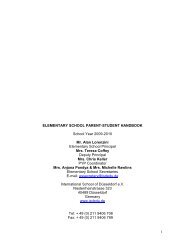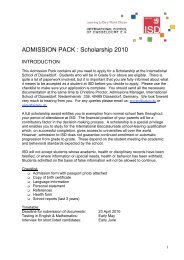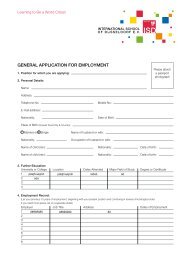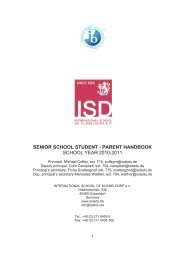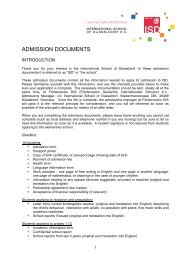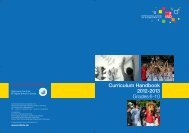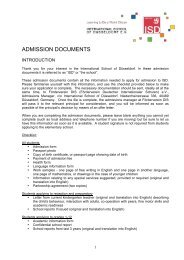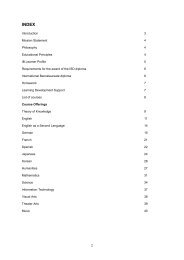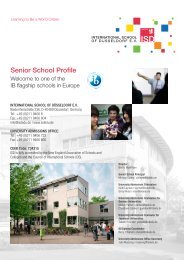Curriculum Handbook 2012-2013 Grades 11-12 - International ...
Curriculum Handbook 2012-2013 Grades 11-12 - International ...
Curriculum Handbook 2012-2013 Grades 11-12 - International ...
You also want an ePaper? Increase the reach of your titles
YUMPU automatically turns print PDFs into web optimized ePapers that Google loves.
MATHEMATICS<br />
PHILOSOPHY<br />
We believe that mathematics is an integral part of everyday life. Mathematics is a<br />
way of thinking characterized by processes such as exploration, manipulation,<br />
discovery and classification. It is a precise and concise means of communication<br />
used to represent, to interpret and to predict aspects of our changing world.<br />
We maintain that mathematics is more about process than results. Thus, students<br />
should be expected to communicate effectively, orally and in writing, using<br />
terminology relevant to the discipline. The ISD mathematics programme strives to<br />
establish an atmosphere of self-discovery within the classroom, recognizing that<br />
students need to be active participants within the learning process. Students will be<br />
taught using a variety of methods, which include the use of technology and<br />
manipulative materials. The mathematics' classroom will provide a safe and<br />
respectful environment that is tolerant of mistakes and considerate of the learner's<br />
language level.<br />
Our goal is to help students gain an understanding of mathematical relationships<br />
across topics as well as an appreciation of mathematical applications across various<br />
subject areas. We aim to establish a mathematical awareness that moves beyond<br />
the classroom itself, enabling students to value the essential nature of the subject.<br />
Assessment at all levels of the mathematics programme will include both<br />
summative and formative components. Students will be assessed against criteria<br />
that clearly outline the learning objectives within each branch. Assessment tasks will<br />
include tests, quizzes, mathematical investigations, mathematical modelling<br />
assignments, group activities and individual presentations, as appropriate, as well as<br />
comprehensive summative examinations.<br />
IB DP Mathematical Studies<br />
Prerequisite: IB-MYP Mathematics Grade 10 (Standard or Extended)<br />
IB Mathematical Studies is a two-year IB standard level course which includes many<br />
standard algebra, geometry, and trigonometry topics plus: sets and Venn diagrams;<br />
logic; financial math; probability and statistics; three-dimensional geometry and<br />
introductory calculus. A project (app. 2000 words) is required for internal<br />
assessment. Note: The German Kultusministerkonferenz does not recognize the<br />
validity of this course. The use of a graphics display calculator is a requirement<br />
of the course. Calculators can be purchased through the school at the<br />
student’s own expense.<br />
IB DP Mathematics SL<br />
Prerequisite: IB-MYP Mathematics Grade 10 (Standard or Extended)<br />
IB Mathematics SL is a two-year standard level course which reviews many topics<br />
from the branches of algebra, trigonometry and geometry plus: functions;<br />
differentiation and its applications; integration and its application; vectors and<br />
matrices; probability and statistics; coordinate and analytical geometry. A portfolio<br />
30<br />
THEORY OF KNOWLEDGE<br />
Prerequisite: normally open only to IB diploma candidates<br />
Ex –EAL Students<br />
Social Studies Electives<br />
TOK is a two-year, 100 hour course taken by all IB diploma candidates. The course<br />
No Pre-requisite<br />
introduces students to critical examination of the types, nature and limitations of<br />
Ex –EAL different Students ways of knowing. By considering the roles of language, perception, reason,<br />
Social Studies and emotion Electives in the processes of knowing, various systems of knowledge, and value<br />
No Pre-requisite judgments in relation to knowledge, students confront the fundamental questions:<br />
“What do we know” and “How do we know what we know”. In the two-year<br />
programme students will give formal oral presentations and produce one written<br />
essay which is externally moderated. A selection of each student's written work plus<br />
a formal oral presentation form the basis for successful completion of the course,<br />
and the awarding of bonus points toward the IB diploma.<br />
TOK 1<br />
Ways of knowing: nature of knowledge and thought; role of language, perception,<br />
reason, and emotion in knowledge and thought; need for logical rigor in knowledge.<br />
Areas of knowledge: mathematics and natural sciences.<br />
TOK 2<br />
Areas of knowledge: human sciences and history, the arts and ethics. Value<br />
judgments and knowledge: moral & political judgment; aesthetic judgment; literary<br />
judgment; knowledge and truth.<br />
A final aim of the TOK course is to consider the nature of knowledge itself.<br />
Our substantial knowledge cannot give us certainty, and it is in fact possible to doubt<br />
almost everything. But extreme scepticism, whilst logically possible, is in the end<br />
rather uninteresting – it doesn’t really get us anywhere. We must accept that<br />
knowledge is by its very nature provisional, that what was once certain is no longer<br />
so. Furthermore, it is possible that there are important truths that lie forever beyond<br />
the grasp of our intellects. The one comfort here is that, if there are, then we can<br />
never know anything about them.<br />
The gods did not reveal, from the beginning,<br />
All things to us, but in the course of time<br />
Through seeking we may learn and know things better<br />
But as for certain truth, no man has known it,<br />
Nor shall he know it, neither of the gods<br />
Nor yet of all the things of which I speak.<br />
For even if by chance he were to utter<br />
The final truth, he would himself not know it:<br />
For all is but a woven web of guesses.<br />
(Xenophanes)<br />
<strong>11</strong>



